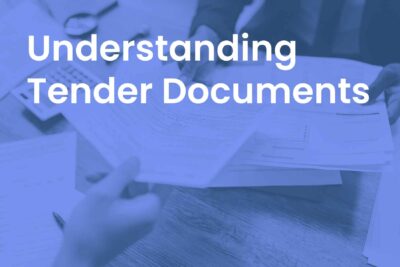
Bid writing is not easy. It can take years to master and even the professionals can sometimes make mistakes. It is important therefore to make sure that every bid you write is as good as it possibly can be. In this article we discuss a few top tips to help improve your bids.
1. Split Each Question Out
It is easy to feel overwhelmed when first presented with the document suite for a new tender. There may be hundreds of pages to trawl through before you can be sure that it’s right for you, and then you have to find the questions. When approaching any new bid, organisation is key.
We always recommend that you separate each quality question out into it’s own working document. This allows you to allocate time and resources more effectively as you can clearly see how much work is involved overall and per question.
Splitting each question out also means that they are more easily accessible at a glance and there is less noise than if you were to write your responses in one large document.
This organised approach also ensures that you don’t miss anything while writing or as you submit, as each question has it’s own dedicated place.
2. Strip Each Question Down
In order to answer each question properly, it is important that you know precisely what the evaluator is looking for. We were all taught this in school, but the mistake is still made:
Answer the question being asked, not the one you want to answer.
One of the best ways to make sure that you answer the question properly (besides reading the evaluation criteria) is to strip each question out into its component parts, and then use these parts as sub headings.
Some quality questions can consist of multiple paragraphs and so splitting the question down into smaller ones makes sure no aspect is missed.
We’d also recommend doing similar with the evaluation criteria to make sure every avenue is explored and on requirement missed.
3. Benefits Before Features
Simon Sinek has famously discussed at length about the value and importance of explaining your ‘why’ before your ‘what’. While Sinek generally refers to sales and marketing when he talks about this, the same theory holds true for bids.
It can be tempting when writing bids, to dive straight into explaining all about your product or service (‘what’) without first considering the reason for it (‘why’).
There is a good chance that every one of your competitors will have a similarly functioning product or service. It is therefore down to you to explain why yours is better. Discuss the benefits of your product before it’s features.
Example:
‘What’ Before ‘Why’
“We will be using our state-of-the art floor cleaners for the duration of this contract, ensuring that all of your floors will be cleaned 3x faster than before, saving you time and money.”
Instead:
‘Why’ Before ‘What’
“We can save you time and money by cleaning your floors 3x faster than before thanks to our new, state-of-the-art floor cleaners.”
The latter is clearly the more impactful sentence. By expressing benefits first, you place the most important aspect of the feature at the forefront. The feature itself is inconsequential compared with the quantifiable value it can bring to the buyer.
4. Review Early
Reviews are vital to success in the tendering process however we find that they rarely occur often enough.
Last-minute reviews will rarely add value to a proposal but will usually simply pick up grammar and spelling errors which will not make much difference overall.
Instead, try having your bid reviewed earlier. We generally recommend directly after the structuring stage as the best time to review. Having a fresh pair of eyes read your plan and structure will allow for omissions or erroneous inclusions to be highlighted and fixed. This style of review is guaranteed to increase the value that your proposal offers.
5. Stay Consistent
Consistency in bid writing is absolutely vital. Make sure that your style, design, tone, and phraseology are the same throughout.
Consistency is especially important to remember when there are multiple writers involved. In this case, it is a good idea to meet at the very beginning of the process to discuss your approach and how you’d like your bid to come across. Make sure everyone agrees and is on the same page otherwise bids can seem disjointed and rushed.
Make sure to agree on and stick to consistent:
- tone and style of writing
- naming conventions for yourself and the buyer
- win themes and value propositions
To guarantee consistency, make sure to have your bid reviewed regularly. An external eye on the overall proposal will help identify inconsistencies that you as the writer could miss.
6. Ghost the Competition
If you are proud of your product or service, there is a good chance that your competition will feel the same about theirs. You must therefore consistently consider the strengths and weaknesses of what you are up against and ‘ghost’ the benefits and drawbacks of your competitors’ offerings.
If your competitors have a specific weakness, mention how your solution overcomes the same weakness.
You should recognise your own weaknesses and highlight them yourself before your opposition can. Explain how you’re working to fix them.
If your competition are strong, explain why you’re stronger.
Example:
Smaller Companies: Ghost the ‘size’ argument by stressing your responsiveness, single point-of-contact, track record and personal service.
Larger Companies: Ghost with your depth of technical resources, experience and staffing.
If you are going to ghost your competition, be careful. Don’t ever mention their name, and be careful not to over do it. There is a fine balance between well-judged slights, and condescending jibes.
7. Don’t Assume
It is easy when writing a bid to assume that the reader on the other end is familiar with your service, industry, product or even – if you’re an incumbent provider – your company and staff.
It is important however, that you approach every bid as if the reader knows nothing at all. There is a chance that the buying authority has hired in new staff, or a consultancy firm to handle their procurement for example. Either way, you should write your bid as though the reader knows nothing about your service. Not only will this help to avoid any confusion, it will also force you to consider your service in more detail. You may have forgotten to include a fact, figure or additional service which could enhance the quality of your proposal.
It is worth noting here also, that you should approach each individual question as its own separate entity. You can never be sure who will evaluate each question as there is a chance that different evaluators may be assigned to each one. You cannot therefore assume that because you mentioned a key value proposition in question 1, it will be remembered without reference in question 5.
8. Copy & Pasting
As a general rule, it’s best not to use copy-paste at all if you can avoid it. However this is obviously a little unrealistic.
Copy-pasting small sections of information can be a useful way to help save time in what can often be a very lengthy bidding process. It is important however that you don’t overdo it. Bids which simply copy large chunks of boilerplate or marketing text rarely succeed as they are not formulated towards any specific opportunity.
Each bid you write must be unique and must focus on how you will support a specific buying authority, with a specific solution, based around their specific requirements. No amount of copy and paste can accurately describe this.
You must be selective with the information that you copy into your proposal. Carefully tailor every word afterwards, to ensure that it remains relevant and adds value. If it doesn’t add value, don’t put it in.
The most important thing when copy-pasting is that you be very careful. Read every word carefully and make sure to remove any information which shouldn’t be there. Old contract or service information could be very bad news for your bidding prospects and leaving in an old client name is a sure-fire way of making sure your proposal ends up in the bin.
While trivial, or overly simple many of these tips may seem, we have seen in our experience how each and every one can make the difference between a win and a loss. Whether it be through the avoidance of a critical error or through the enhancement of your proposed solution, these tips are guaranteed to help improve your bids instantly.
Did you enjoy this post?
Click Here for 6 Benefits of Outsourcing Your Bid Management.
Follow Us!
Follow Bespoke Bids on Linkedin to keep up with our day-to-day operations. We post live tenders, tips and tricks and more.


